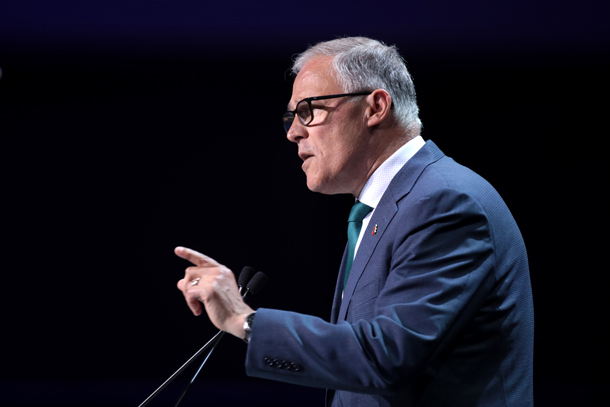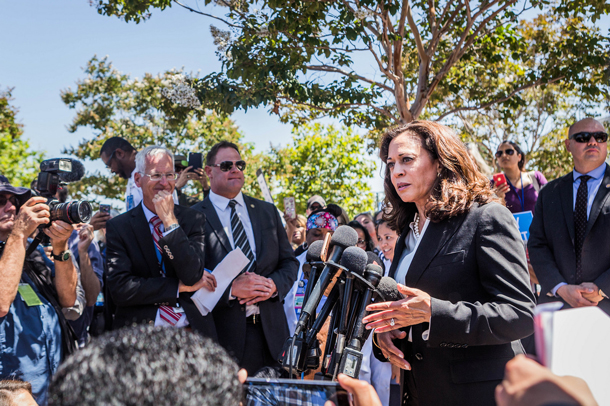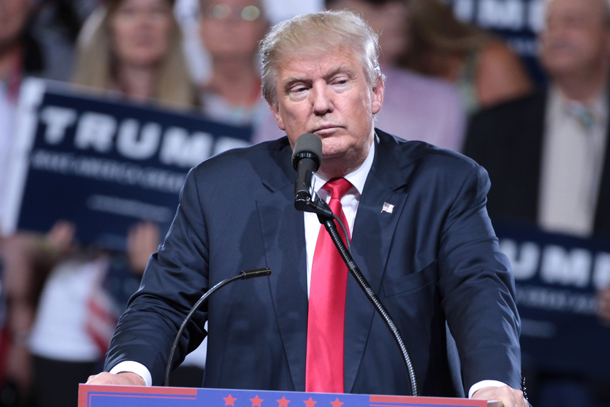Rating the Climate Promises of 2020 Prexy Candidates
Air Date: Week of June 21, 2019

Demoratic Presidential hopeful and Washington Governor Jay Inslee fared best on Greenpeace’s climate scorecard, but still didn’t make a perfect grade: he received an A-. The organization says all the 2020 presidential candidates have room for improvements in terms of their climate commitments. (Photo: Gage Skidmore, Wikimedia Commons, Gage Skidmore from Peoria, AZ, United States of America, CC BY-SA 2.0)
Although climate wasn’t discussed much in the 2016 presidential election, this time around it’s turning out to be a much hotter topic. With over twenty Democratic candidates on the playing field, it can be hard to keep track of where they all stand on the climate crisis. So to sort it all out, Greenpeace put together a climate scorecard, grading each candidate on their commitment to a Green New Deal and to phasing out fossil fuels. There are a couple of standout candidates, but not a single presidential hopeful earned a Greenpeace A+. To hear about the scorecard, Host Steve Curwood speaks with Janet Redman, Climate Campaign Director for Greenpeace USA.
Transcript
CURWOOD: Climate change was barely mentioned during the 2016 presidential election but this time around many Democratic presidential contenders are pledging climate action. But with over twenty Democratic candidates it can be hard to keep track of where they each stand on the climate crisis. So, to sort it all out, Greenpeace USA put together a climate scorecard, grading each candidate on his or her support for a Green New Deal and to phasing out fossil fuels. Here now is Janet Redman, Climate Campaign Director for Greenpeace USA, on the line from Washington, DC—hi, Janet, welcome to Living on Earth!
REDMAN: Thanks so much for having me. It's a pleasure to be with you.
CURWOOD: So, Janet, you took all these candidates and graded them based on their climate rhetoric. Tell us about the criteria you used—what did you use?
REDMAN: Certainly, we started with two big sets of criteria. We're looking at each candidate's support of the Green New Deal, and each candidate's support of phasing out fossil fuels. The Green New Deal, of course, is an ambitious plan that's looking at how to move to 100% renewable energy in a way that's just and fair, both for workers and communities. So, it's really about tackling the climate crisis, but making sure we're tackling economic crises and other injustices is at the same time. So the kinds of criteria we've got, and there about seven or eight criteria, are around getting to net zero greenhouse gas emissions, supporting the Paris Agreement, looking at labor protections, really understanding what candidates are saying about climate resiliency and their commitments to moving towards zero emissions in the transport sector, power sector, building sector, industrial sector, etc.
CURWOOD: And what about the other category?
REDMAN: The other category that I think is really exciting and is less talked about, is about phasing out the fossil fuel industry. And that's really the complement to the Green New Deal. Phasing out fossil fuels is about dialing down the dirty energy we already have under production right now and making sure we're not expanding into new dirty energy. So, that is looking at whether or not candidates have committed to a responsible and managed phase out of fossil fuels over time, whether they've committed to ending fossil fuel leasing on public lands, ending subsidies, taxpayer subsidies to oil and gas, banning oil and gas exports. Really thinking about polluter accountability and environmental justice for those communities who are already impacted by production. A key piece that we're asking every single candidate to do, and doing this in coalition with many, many environmental groups, is to ask every single candidate to take a pledge not to take any money from the fossil fuel industry. It's called the no-fossil-fuel-money pledge. We've got, I think now, 18 out of the leading Democratic presidential candidates have taken this pledge. But that's one of the markers that we're also looking at in terms of grading these candidates.
CURWOOD: So, one of the things that happened as coal wound down was communities were just simply left high and dry. What about that aspect of the workers who'll be left behind if you phase out fossil fuels?

Some candidates, like Kamala Harris, had not yet responded to Greenpeace’s climate questionnaire as of June 18 and have not yet released a comprehensive climate plan, making it difficult to evaluate their commitment to address the climate crisis if elected to the White House. (Photo: Office of Senator Kamala Harris, Wikimedia Commons, Public Domain)
REDMAN: That's exactly why we need a responsible phase out. We will have a transition away from dirty energy, I firmly believe that, because we're seeing so many impacts of climate change right now. And because frankly, renewable energy costs less than dirty energy. We already saw that with the coal industry. So what happened with the transition in the coal industry is that that was an unmanaged transition. So the transition plan was: coal companies go bankrupt and they leave communities and workers high and dry. They've broken their promises to make sure that coal miners have their pensions as they get older, they've broken their promises to fund funds for making sure that miners with black lung have their health costs paid for, they've broken their promises to communities that there would be an economic development transition. So what we don't want to see happen is an unmanaged, irresponsible transition away from oil and gas. We want to make sure that we're putting plans in place now to responsibly phase that down over time. No one's talking about pulling the plug on all of the fossil fuel electricity generation, for example, right this second. What we're talking about is making sure, number one, we're not building new oil wells, we're not building new oil rigs, we're not going out and exploring for new oil and gas. That's the first step. And then number two, let's put a plan in place with the full weight of the federal government behind us to make sure that we are, in fact, phasing out of these fossil fuels in the way that is most responsible to people working in the industry, and responsible to all the communities who depend right now on the fossil fuel industry as part of their tax base, as part of their jobs base. We can do this; it just takes actual planning.
CURWOOD: So, those were the criteria that you used to look at the candidates for president. But how did you figure out their grades?
REDMAN: First and foremost, we sent a survey to every single campaign office and asked for detailed answers to all of our more than 21 questions. We received about five or six of those back before we published the scorecard. And for everyone else, including the folks that responded to the survey, we looked at the public record. And that meant looking at, certainly, candidates’ voting records, looking at public statements that had been made, looking at existing climate platforms that candidates had put forward. What's really important, though, we intentionally weighted really forward-looking commitments at this point in time. First of all, because not every single candidate has been a part of the Senate or the House. But I think, even more importantly, because what we're talking about right now is, in the early days of the election season, is really setting the level of ambition amongst candidates on climate change. We're really pushing to make sure that all these candidates understand that the American public is not just interested in climate change as an issue, but feels incredibly strongly that we need the next president to address both a Green New Deal and a fossil fuel phase out. So, we were particularly looking for climate plans that candidates had put forward making ambitious statements, setting ambitious targets for action.
CURWOOD: So, you said you sent surveys to the presidential candidates and you only got five, was it six, back? Which ones responded?
REDMAN: Certainly, we got responses back from Senator Booker, Tulsi Gabbard, Kirsten Gillibrand, Governor Inslee, Senator Warren's office, all responded back to our survey.
CURWOOD: Okay, time now to see the envelopes opened. Which candidates came out on top?
REDMAN: Right now, Governor Inslee has the highest score in our scorecard with an A minus. I should note that all of the scores are relatively low. We, again, set a range of 100 points and the idea is that to get 100 points, you really need to make some bold, ambitious statements and have some really concrete plans about how to address the climate crisis in a manner that is commensurate with the challenge we're facing. So, at 80 points Inslee comes in with an A minus. He has articulated multiple pieces of a climate plan and released those, he addresses the fossil fuel phase out. And also, of course, has come out in favor of the Green New Deal.
CURWOOD: So, Janet, which candidates have some room for improvement?
REDMAN: Well, every candidate, of course, has tons of room for improvement. Maybe I'll talk about Vice President Biden quickly. In our original scoring, he received a D minus. He didn't have a climate plan. He hasn't said much about climate change in his campaign so far. But after our scoring, a couple days after our scorecard originally was released, he did release, his campaign did release, a climate plan, which was much broader than we thought it would be. Frankly, we were pleasantly surprised. He actually has moved up to a B, which is exciting. And those places where he has room for improvement, there are things like taking the no-fossil-fuel-money pledge, which just about every other frontrunner has done so far in the Democratic field, that he could take those actions immediately and up his grade some more. There are other folks like Kamala Harris, who is an exciting candidate, but has not taken the survey and has not released a climate plan to date. So, she just doesn't get much of a score because there's not much to score her against. So, we're really looking forward to a number of candidates releasing their climate plans and a number of candidates refining what they've talked about in terms of climate commitments, so we can really judge them against each other and understand what exactly they would stand for if they were in the White House in a couple of years.
CURWOOD: Let's quickly walk through the top of your list.
REDMAN: Sure. At the top of our list is Governor Inslee, A minus; Senator Booker, A minus; Senator Sanders with a B plus; Senator Warren with a B plus. Next is Gillibrand with a B; Tulsi Gabbard with a B; Vice President Biden with a B; and Marianne Williamson, also with a B. Following them is O'Rourke with a B minus.
CURWOOD: And then who's in the C territory?
REDMAN: So, following behind the frontrunners, we've got Pete Buttigieg, Senator Harris both having C's; Swalwell, Delaney, Klobuchar in C minuses. We've got Castro and Yang and Tim Ryan with a D plus. And then Bullock and Hickenlooper with D, D minus. Most of those lower grades are because those candidates have either not released a plan on climate change at all, or actually said things that we think are really counter to climate action, for example, saying that gas is a bridge fuel, when we know it's actually a fossil fuel that makes climate change even worse.
CURWOOD: And where are the Republicans on your list?
REDMAN: Well, right now, of course, there are only two Republican candidates: Trump, who's running and has the RNC's backing; and Weld, both of which have F's. Trump has a hot zero, which is not surprising given what he's done so far in office, including rolling back environmental regulations and health protections, committing to expanding oil and gas drilling off our coasts and in our public lands, and really has been promoting this "energy dominance" agenda, which means expanding fossil fuels and ignoring the climate crisis at a time when we really need to be taking action.
CURWOOD: And Governor Weld?
REDMAN: Governor Weld has a seven. He has said important things about going to net zero greenhouse gas emissions and supports going back to the Paris Agreement. But besides that, has said little else.
CURWOOD: So as far as Greenpeace is concerned, both Republicans are seriously flunking.

Trump came in last place on Greenpeace’s scorecard, receiving a “hot zero” for his ongoing hostility towards environmental regulations, his eagerness to open American shorelines and public lands to fossil fuel exploration, and his open denigration of climate science. (Photo: Gage Skidmore, Wikimedia Commons, CC BY-SA 2.0)
REDMAN: They're seriously flunking. When we look at room for improvement, there is massive room for improvement right now in the Republican candidate field. And we would like to see improvement there as well. This is really not a Democrat or Republican issue. This is an issue that impacts every single person across the United States already today, and of course, is a critical geopolitical issue that any next president will have to deal with on the global stage.
CURWOOD: Janet, how optimistic are you that this cycle of presidential elections will result in firm action on climate? As Bill McKibben is famous for saying, we've had a bipartisan deal to not really do much on climate. Even President Obama, for example, couldn't quite get the regulations to deal with the Clean Power Plan on the books.
REDMAN: I'm very optimistic. I think the answer to whether or not we'll see the next president talk about climate change and do what needs to be done on climate change is really up to us. We need to be making sure that every candidate hears every single day that climate change is on the top of the agenda, and we need to be demanding that the kinds of proposals and the kinds of promises that these candidates are making are strong, are bold, are inspiring, are frankly, commensurate with the challenge we're facing. And then whoever gets elected has to be held accountable. I think the climate movement was a little easy on Obama in the first years of his presidency, and that probably allowed him to slip on climate action. So, whoever's in the White House next, people across the United States who are impacted by climate change need to hold the next president accountable. And that's a big part of what Greenpeace is committed to doing, and certainly working with allies across the country to make sure whoever's in the White House next has the political space and the political pressure to act on climate fast and furiously.
CURWOOD: Janet Redman is Climate Campaign Director for Greenpeace USA. Thanks so much for taking the time with us today.
REDMAN: Great to be with you. Thanks very much.
Links
Living on Earth wants to hear from you!
Living on Earth
62 Calef Highway, Suite 212
Lee, NH 03861
Telephone: 617-287-4121
E-mail: comments@loe.org
Newsletter [Click here]
Donate to Living on Earth!
Living on Earth is an independent media program and relies entirely on contributions from listeners and institutions supporting public service. Please donate now to preserve an independent environmental voice.
NewsletterLiving on Earth offers a weekly delivery of the show's rundown to your mailbox. Sign up for our newsletter today!
 Sailors For The Sea: Be the change you want to sea.
Sailors For The Sea: Be the change you want to sea.
 The Grantham Foundation for the Protection of the Environment: Committed to protecting and improving the health of the global environment.
The Grantham Foundation for the Protection of the Environment: Committed to protecting and improving the health of the global environment.
 Contribute to Living on Earth and receive, as our gift to you, an archival print of one of Mark Seth Lender's extraordinary wildlife photographs. Follow the link to see Mark's current collection of photographs.
Contribute to Living on Earth and receive, as our gift to you, an archival print of one of Mark Seth Lender's extraordinary wildlife photographs. Follow the link to see Mark's current collection of photographs.
 Buy a signed copy of Mark Seth Lender's book Smeagull the Seagull & support Living on Earth
Buy a signed copy of Mark Seth Lender's book Smeagull the Seagull & support Living on Earth

